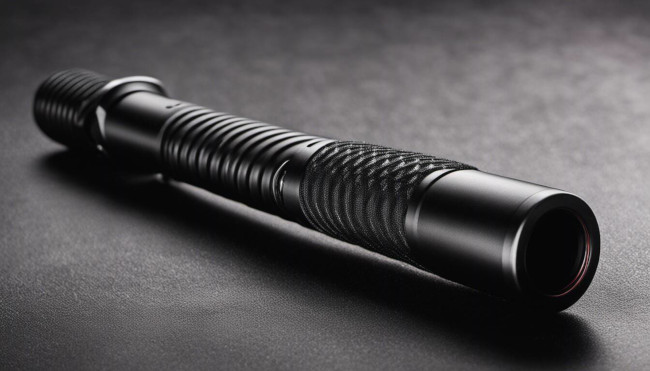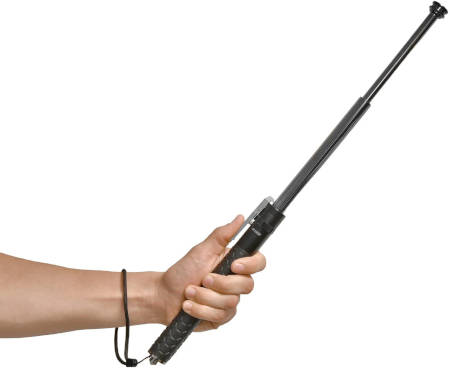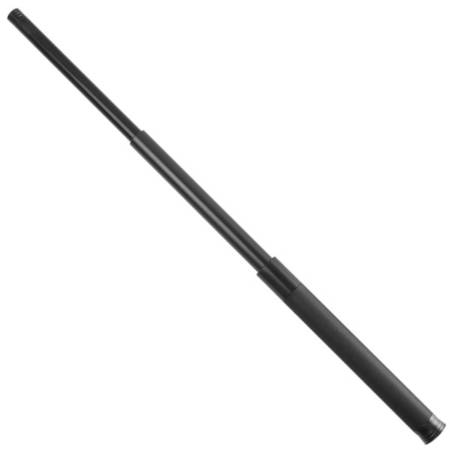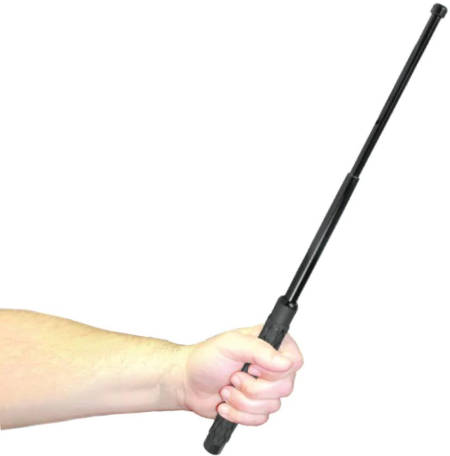Tactical Baton

In a world that appears to become more unpredictable by the day, it's never been more crucial to prioritize personal safety. The tactical baton, often overlooked, may be one of your most formidable allies in ensuring peace of mind and tops the charts of self-defense tools. Dive into this comprehensive guide as we delve into the intricacies of tactical batons, and unravel how they can prepare you to face any potential threats confidently with extensive detail on their design, functionality, legality, and effective usage techniques. Brace yourself for an enlightening journey towards empowering your security - because everyone deserves the right to feel safe!
A tactical baton is a non-lethal weapon often used by law enforcement and civilians for self-defense. It is made of solid steel and can be quickly deployed to strike, incapacitate, and evade attackers while minimizing harm to oneself. Tactical batons offer increased protection and distance from the attacker as they expand from 16" to 31" in length. These batons are effective in physically stopping an assailant, giving you time to escape without causing deadly harm to the attacker. However, it's important to note that collapsible batons may be illegal to carry in some states and possessing one without proper training could result in injury or legal consequences.
Understanding Tactical Batons
In the realm of self-defense and personal safety, tactical batons have emerged as reliable tools that offer both protection and ease of use. To understand these weapons, it's important to grasp their purpose and design. Tactical batons, also known as expandable or collapsible batons, are non-lethal weapons trusted by police departments worldwide. These batons are designed for self-defense situations, enabling individuals to physically stop an assailant while minimizing harm to themselves and preventing deadly harm to the attacker.
| Feature | Description |
|---|---|
| Design | Tactical batons are compact when closed and expandable when needed, making them easy to carry and store. They often extend from 16" to 31" in length, offering increased protection and distance from the attacker. |
| Material | These batons are made of high-grade materials like solid steel, ensuring durability and reliability in confrontational situations. |
| Deployment | Tactical batons can be quickly deployed with a flick of the wrist, allowing for swift response against a violent assailant. |
| Functionality | They can be used to strike, incapacitate, and evade attackers effectively, providing users with valuable time to escape dangerous situations. |
Think of a tactical baton as your trusty sidekick in times of need—compact and concealable when you don't need it but ready to defend you at a moment's notice.
Understanding the purpose and advantages lays the foundation for exploring the different varieties available in the market today.
Varieties of Tactical Batons
When it comes to tactical batons, various options exist to cater to individual preferences and needs. It's crucial to consider factors like legality, training requirements, and personal comfort before making a decision. Let's explore some popular varieties:
-
Expandable Baton: Also known as telescopic batons, these batons are designed to extend when needed and collapse for easy carry. Expandable batons offer versatility, allowing users to adjust the length based on the situation while remaining compact when not in use.
-
Collapsible Baton: Similar to expandable batons, collapsible batons provide the ability to adjust their length for different scenarios. However, legal restrictions may apply in some states or countries, making it essential to check local regulations before considering this option.
-
ASP Baton: ASP batons refer to a specific brand known for manufacturing high-quality tactical batons used by law enforcement professionals. They often come with advanced features such as friction locks and distinctive grips, providing enhanced control and retention during critical situations.
-
Specialized Batons: Beyond the traditional expandable and collapsible options, specialized batons exist for specific needs. These can include side-handle batons, which offer additional grip options, or kubotans that serve dual functions as keychains and striking tools.
It's worth noting that these are not all-inclusive of the varieties available, but they represent common choices on the market today. Personal preference and functionality play a significant role in choosing the right self-defense weapon for an individual's needs.
While tactical batons have proven themselves reliable in many instances, it's important to remember that no self-defense tool offers guaranteed success in every situation. Videos have surfaced showing instances where batons were ineffective against determined attackers. This highlights the need for proper training and a thorough understanding of both offensive deployment and weapon retention techniques if one chooses to rely on a tactical baton for personal safety.
Having explored the understanding and varieties of tactical batons, we will now delve into the advantages they offer in self-defense situations.
- According to the Bureau of Justice Statistics (U.S.) report in 2018, approximately 73% of law enforcement agencies equip their officers with expandable batons.
- A nationwide survey conducted in 2020 revealed that up to 15% of adults in the United States have purchased a self-defense tool such as an expandable baton for personal protection.
- Research in 2021 showed that among non-firearm self-defense tools, tactical batons represent around 18% of all purchases, indicating their popularity as a compact and concealable self-defense option.
Advantages of Tactical Batons
When it comes to self-defense and personal safety, tactical batons offer several advantages that make them a popular choice among individuals seeking non-lethal self-defense options. Let's explore some of these advantages in detail.
First and foremost, self defense batons are compact and easily concealable, making them convenient to carry in various situations. Unlike firearms, which require licenses and strict regulations, batons can be legally carried by individuals who may not have access to firearms or prefer non-lethal alternatives.
Furthermore, tactical batons are versatile tools that can serve multiple purposes. They can be used for striking, blocking, disarming an assailant, or even as a tool for gaining control in certain situations. Their extended reach can provide an added advantage by allowing you to keep a safe distance from your attacker while still having the ability to defend yourself effectively.
In terms of effectiveness, expandable batons are designed to deliver a significant amount of force upon impact. They are constructed using high-grade materials such as solid steel, ensuring durability and maximum impact when used properly. This means that even though they are non-lethal weapons, they can effectively physically stop an assailant, providing you with precious time to escape or seek help.
Another advantage of is that they do not cause deadly harm to the attacker when used appropriately. This can be considered a morally favorable option for individuals concerned about causing permanent injury or taking someone's life in self-defense situations.
It is important to note that personal preference and functionality play a significant role in choosing a self-defense weapon. Some individuals find tactical batons efficient and effective based on their needs and level of comfort with using such devices. However, it's crucial to remember that proper training and practice are essential for utilizing batons effectively and safely.
Convenience Compared to Firearms
Firearms are undoubtedly powerful self-defense tools, but they come with certain limitations and inconveniences that may not be suitable for everyone. This is where tactical batons can offer a significant advantage in terms of convenience.
One of the primary considerations is the legal requirements and restrictions associated with firearms possession. Obtaining a firearm license, completing background checks, and adhering to strict regulations can be time-consuming and may not be feasible or desirable for everyone. In contrast, tactical batons are typically legal to carry without extensive licensing procedures, potentially making them more accessible for personal defense purposes.
| Tactical Batons | Firearms | |
|---|---|---|
| Licensing | Few or no licensing required | Extensive licensing required |
| Portability | Can be easily carried | Larger size and weight |
| Accessibility | Available to more individuals | Limited by legal restrictions |
| Training | Requires training for effective use | Requires extensive training |
Think of it this way: Choosing between a tactical baton and a firearm is similar to choosing between a lightweight backpack and a heavy suitcase when traveling. While both serve the purpose of carrying your belongings, the backpack offers greater ease of mobility and less hassle in terms of storage and handling. Similarly, tactical batons provide convenience without compromising effectiveness in self-defense situations.
That being said, it's important to acknowledge that firearms may still have their place in certain scenarios where there is an immediate threat to life or in situations that require long-range capabilities. However, tactical batons can be a viable choice for individuals who prefer non-lethal self-defense options and prioritize convenience.
Tactical Baton Applications
The tactical baton is a versatile self-defense tool that finds applications in various situations. Understanding the tactical baton's applications is crucial whether you are a security professional, law enforcement officer, or an individual seeking personal safety.
In the realm of security personnel and law enforcement, the tactical baton serves as an essential tool for maintaining public order and ensuring safety. Security guards and police officers often employ these for crowd control, restraining suspects, and diffusing potentially volatile situations. Its extendable nature allows it to be easily carried on one's person without hindrance but expand to its full length when required.
For instance, imagine a security guard patrolling a large event where tensions are running high among attendees. By employing their weapon effectively, they can establish a physical barrier between individuals or use controlled strikes to incapacitate potential threats without causing significant harm.
Moreover, the tactical baton's effectiveness goes beyond just security personnel. Many individuals seeking personal safety choose these as a reliable option for non-lethal self-defense weapons. The compact size and ease of concealment make them ideal for carrying on your hip, in a bag, or even under the driver's seat of your vehicle.
Now, some might question whether expandable batons are truly effective in real-life situations. While it is true that no single self-defense weapon can guarantee absolute safety, expandable batons have proven themselves to be reliable tools. Police departments worldwide trust these non-lethal weapons due to their ability to physically stop an assailant momentarily, giving you precious seconds to escape.
"I've seen countless videos online where people successfully use expandable batons to defend themselves against attackers," says Sarah, a self-defense instructor. "Sure, it requires proper training and technique, but knowing how to strike effectively with a baton can really make a difference in a dangerous situation."
The high-grade materials used in the construction of expandable batons, such as solid steel, ensure their durability and effectiveness. These batons often extend from 16" to 31" in length, offering increased protection and distance from an attacker.
- The tactical nightstick is a versatile and effective self-defense tool that can be used by security personnel, law enforcement officers, and individuals seeking personal safety. Its practical applications include crowd control, restraining suspects, diffusing potentially volatile situations, and non-lethal self-defense. Expandable batons have proven to be reliable tools due to their ability to physically stop an assailant momentarily, giving you precious seconds to escape. Proper training and technique are required for effective use, but the high-grade materials used in their construction ensure their durability and effectiveness.
Situational Self-Defense
In addition to its use by security personnel, the tactical baton is an effective tool for situational self-defense. This means that even individuals who are not security professionals can benefit from carrying a tactical baton as part of their personal safety arsenal.
When faced with an imminent threat or potential attack, it provides a means of striking back with force while minimizing harm to oneself. By utilizing proper training and technique, individuals can learn how to effectively strike, incapacitate, and evade attackers.
Let's consider a scenario where situational self-defense becomes essential - walking alone at night in a dimly lit parking lot.
As you navigate your way towards your car, you notice someone acting suspiciously nearby. Your instincts kick in, and you begin to feel uneasy. In this situation, having a tactical baton within reach can provide a sense of security and empowerment. If the individual approached you aggressively or attempted to physically harm you, you would have a tool to strike back and create enough distance to escape.
It's important to note that self-defense is not just about physical capability but also about being aware of your surroundings, trusting your instincts, and taking preemptive action when necessary. Carrying a tactical baton can serve as both a deterrent and a last-resort option for protecting yourself in times of danger.
Remember, personal preference and functionality play a role in choosing a self-defense weapon. While some may find the tactical baton efficient and effective, others may prefer alternative options such as heavy-duty mag lights. A flashlight with the ability to serve as a baton may offer more weight and impact to stop an attacker.
Top Batons for Security Personnel
Security personnel often rely on tactical batons as a vital tool for self-defense and maintaining personal safety. The market is abundant with various options, but let's explore some of the top batons favored by security professionals.
One highly recommended choice is the Police Force Spring Loaded Baton. With a positive lock safety that is conveniently activated with your thumb, this auto baton forcefully opens with a simple press of the release button. In a fraction of a second, your baton is extended and ready to use. It stays extended and will not collapse until you want it to.
An easy-to-close option is the Safety Technology Push Button Baton. This one features a wrist release, allowing for swift deployment in critical situations. The Drum Disk Locking Structure keeps it extended for the duration of your use. Its durable, high-strength aluminum construction ensures reliability and can be closed quickly by pushing the disc on the end cap. Available in different lengths, security personnel can choose the one that suits their needs best.
Another popular option is the Police Force Extendable Baton. This baton incorporates an auto-locking mechanism designed for secure deployment and efficient collapse when not in use. Its improved strength and durability make it a preferred choice among security personnel who value reliability in high-stress situations. Like the others, it comes in various lengths to accommodate different preferences.
If you're looking for a compact yet effective option, the Police Force Keychain Baton is worth considering. With its steel construction and small size, this one offers both strength and portability. It can be easily deployed with a flick of the wrist, making it an ideal choice for security personnel who prioritize quick access to their self-defense tools.
While these are just a few examples, other brands like Fury Tactical Expandable Steel Baton and Cold Steel models have also garnered positive reviews within the security community. It's important to note that specific models may vary in terms of length, weight, material composition, and grip options. Therefore, it's crucial to consider individual preferences and requirements when selecting a suitable baton for personal safety.
Now that we've covered some of the top choices for security personnel, let's shift our focus to understanding police department preferences when it comes to tactical batons.
Police Department Preferences
Police departments prioritize certain features and specifications to equip their officers with effective self-defense tools. These preferences are based on years of experience and feedback from law enforcement professionals who require reliable equipment to carry out their duties.
One aspect that holds significant importance is the locking mechanism. Advanced locking systems like the push-button release mechanism in the Push Button Baton or auto-locking mechanisms like those found in batons like the Monadnock AutoLock X3 are favored by police departments due to their secure and quick deployment capabilities. Officers need a baton that can reliably lock into place for defensive strikes and collapses easily when not needed.
Another factor considered is durability. Police departments rely on batons that can withstand demanding situations and provide long-term use. The heat-treated black steel construction of the Smith & Wesson Heat Treated Collapsible Baton ensures strength and durability, allowing officers to rely on them during encounters that put their safety at risk.
Additionally, ergonomics and grip options are taken into account. Law enforcement officers often need to maintain a firm grip on their batons, even in high-stress situations. Batons with textured handles or rubberized grips provide enhanced control and minimize the risk of losing grip during critical moments.
Ultimately, police departments prioritize batons that offer reliability, ease of use, and durability for their officers as they face unpredictable situations daily. By considering these preferences alongside personal needs, security personnel can make informed decisions when selecting a tactical baton for their own self-defense and personal safety.
Legal Aspects and Training
When it comes to the use of tactical batons for self-defense and personal safety, understanding the legal aspects and receiving proper training are paramount. While recent developments have allowed Hawaiians to carry batons for self-defense, it's important to be aware of the specific laws and regulations in your state or jurisdiction.
Legal Considerations: Each state has its own set of laws regarding the possession, carry, and use of batons or similar self-defense weapons. It is crucial to thoroughly research and familiarize yourself with the laws and regulations in your area. Some states may require permits or licenses to possess a baton, while others may impose restrictions on how and when it can be used. Ignorance of these laws can result in serious legal consequences, so take the responsibility to gather accurate information or seek guidance from legal professionals specializing in self-defense laws.
Understanding the laws governing self-defense weapons empowers individuals with knowledge of their rights and responsibilities. It helps individuals make informed decisions about whether carrying a tactical baton aligns with their particular circumstances and local regulations.
Training for Effective Use: Having access to a tactical baton alone is not enough; proper training is essential for maximizing its potential as a self-defense tool. Training programs specifically designed for using batons focus on teaching techniques that prioritize personal safety while also addressing legal boundaries.
Such training involves learning various strikes, grips, blocks, and disarming techniques that allow individuals to effectively and efficiently protect themselves if confronted with a violent situation. Expert instructors emphasize the importance of situational awareness, de-escalation tactics, and understanding the appropriate level of force to be used in a given circumstance.
Moreover, training sessions often simulate realistic scenarios to help individuals develop the necessary reflexes and decision-making skills under stress. Through consistent practice and training, individuals can enhance their confidence and abilities when it comes to self-defense.
Remember that one's mindset and ability to assess situations accurately play a significant role. Proper training not only provides physical skills but also instills a sense of preparedness and awareness.
Now that we have discussed the legal aspects and emphasized the importance of training, let's explore state law restrictions regarding baton carry and some effective use strategies in different scenarios.
State Law Restrictions and Effective Use Strategies
Understanding the specific laws and regulations regarding baton carry is crucial before making any decisions about personal safety. As mentioned earlier, various states have their own rules and restrictions surrounding self-defense weapons. It is essential to research your state's laws or consult with legal professionals who specialize in self-defense legislation.
Once you are familiar with your state's laws, you can consider developing effective use strategies tailored to your circumstances. A few key factors to keep in mind include:
-
Knowledge of Force Continuum: Understanding the concept of the force continuum is vital for the responsible and effective use of a tactical baton. The force continuum outlines different levels of force that may be justifiably used in response to varying levels of threat or aggression. It is important to know where an individual falls on this continuum based on the situation at hand.
-
Situational Awareness: Being aware of your surroundings at all times is crucial for personal safety. This includes recognizing potential threats or indicators of danger, which allows you to make appropriate decisions regarding self-defense strategies.
-
De-escalation Techniques: Whenever possible, it is important to try de-escalating a situation before resorting to physical force. Verbal communication skills and techniques for calming down a potentially aggressive individual can be invaluable tools in avoiding physical confrontations.
-
Target Selection and Strikes: In a crisis situation where using a baton becomes necessary, understanding target selection and effective striking techniques is essential. Training programs can provide guidance on how to strike with accuracy and maximize the impact while minimizing the risk of causing severe harm.
By understanding state law restrictions and developing effective use strategies, individuals can take steps towards ensuring personal safety while adhering to legal boundaries.
Add your comment now!
Post Comment






